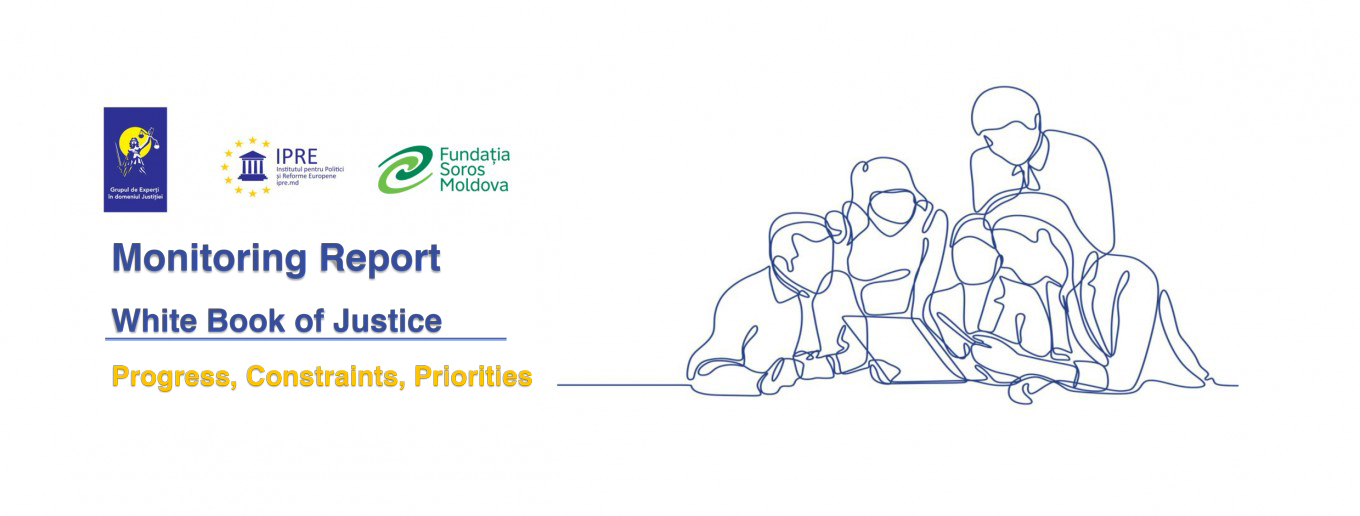The Monitoring Report on the White Book of Justice

The Institute for European Policies and Reforms (IPRE) issued the Monitoring Report on the White Book of Justice, which is an updated summary of progress, constraints and priorities in the field of justice between the 26th of August 2021 and the 15th of January 2022. The report is built based on the structure of the White Book of Justice (WBJ) and analyses the implementation dynamics of the WBJ recommendations for four distinct areas of intervention: strengthening the capacities of justice sector authorities, promoting integrity in the justice sector, strengthening justice sector-related professions and implementing information technologies in the justice sector.
Therefore, the report analyses the actions arising from the White Book of Justice recommendations, which the central public authorities have proposed to undertake in the coming period. Most of these are reflected in the Government Action Plan and the Strategy for Ensuring the Independence and Integrity of the Justice Sector 2022-2025.
Among the most important developments that can be listed during the monitoring period are:
- The adoption by the Parliament with qualified majority of the constitutional amendments on the judicial system, aiming at increasing its independence, efficiency, accountability and transparency.
- Adoption of the Strategy for Ensuring the Independence and Integrity of the Justice Sector for 2022-2025, which is reflecting most of the recommendations of the White Book of Justice, including those concerning the implementation of information technologies at both the pre-judicial and judicial stages, and the inter-linking of justice sector information systems with other available information systems.
- Development of the concept of the extraordinary evaluation of judges and prosecutors (vetting procedure), with the proposal of an extraordinary and extra-judicial mechanism for the evaluation of judges and prosecutors, consisting of the International Monitoring Mission, Evaluation Commission and the Special Board of Appeal.
- Adoption of the law on some measures related to the selection of candidates as members of self-administrative bodies of judges and prosecutors in accordance with the recommendations of the Venice Commission.
- Enhance the SCP’s decision-making transparency by publishing its meetings, motivation the decisions taken and publishing them in due time.
- Initiate the amendment of the Article 46 para. (3) of the Constitution, proposing an exception from the presumption of lawful acquisition of goods for those holding public office.
- Adoption of amendments to Law No. 132/2016 on the National Integrity Authority and Law No. 133/2016 on the declaration of assets and personal interests, extending the list of those to whom assets control applies, introducing the obligation to declare the market value of movable and immovable goods, introducing the reversal of the burden of proof.
- Addressing issues faced by the attorneys’ institution by organising General Assemblies of Bars and Congresses through online platforms.
- Appointment of new members to the Mediation Council, which has ensured functionality in the self-governing bodies of the mediation profession.
- Unblocking the activity and ensuring the functionality of the self-administration bodies of notaries by appointing a new body of the Chamber of Notaries by the Ministry of Justice.
More information on the findings of the Monitoring Report can be accessed here.
The Monitoring Report on the White Book of Justice was developed within the project “Justice Expert’s Group”, implemented with the financial support of the Soros Foundation-Moldova. The content of the publication represents the opinion of the authors and does not necessarily reflect the position of the Soros Foundation Moldova.

